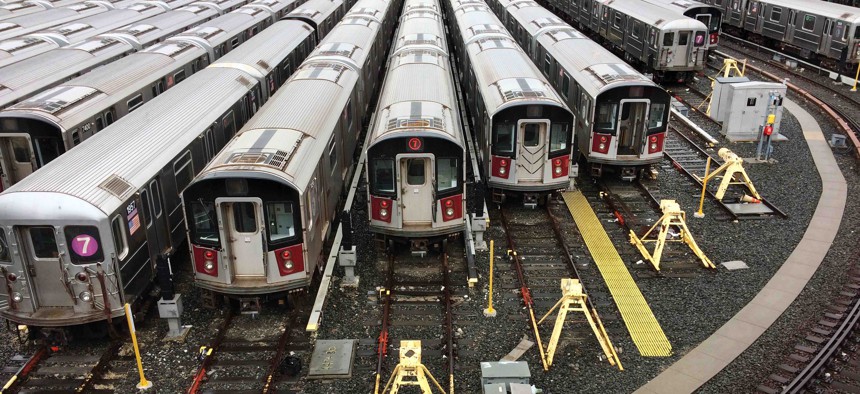Marijuana Gets Attention as Possible Subway Funding Source

Number 7 subway cars are parked at the MTA's Mets-Willets Point rail yard, February 4, 2018 in New York. AP Photo/Mark Lennihan
New York City's mass transit system has been facing financial stress and service problems. Could legalizing pot help?
If recreational marijuana were legalized in New York, the resulting tax revenues could provide a needed funding boost for New York City's financially strained mass transit system, a recent report says.
Researchers at New York University's Rudin Center for Transportation Policy and Management cite estimates showing that a marijuana retail tax rate between 7 percent and 15 percent could generate $110 million to $428 million annually. That would be on top of standard sales taxes.
For comparison, Colorado, the first U.S. state to get its recreational marijuana program up and running back in 2014, has seen tax and fee revenues from the industry rise steadily since that time, from about $67 million to $247 million last year. Those revenues through October of this year totaled $223 million, according to the state.
Michael Gianaris, who chairs the Democratic conference in the New York state Senate, told The New York Times that a panel tasked with recommending new revenue sources for the Metropolitan Transportation Authority, is considering legalized pot as one option.
“There are a lot of needs that we have that new revenues need to be considered for,” Gianaris said. “The MTA is near the top of my list.”
Problems with New York City's subway system have reached crisis proportions during the past couple of years, with delays, train breakdowns, and antiquated signal equipment.
The Metropolitan Transportation Authority, which in the city operates the subway, as well as buses and nine bridges and tunnels, has been searching for new sources of funding to fill shortfalls in its operating budget projected to grow from $262 million in 2020 to $634 million in 2022—even with planned fare and toll increases.
Meanwhile, Andy Byford, president of the authority's transit division, has been pushing for a capital investment plan, known as "Fast Forward," that could cost around $40 billion over a decade.
The MTA board is expected to vote early next year on a fare increase. (The fare for a subway or local bus ride is now $2.75.) Officials have warned that without added revenues, service cuts could be in order.
Could revenues from pot sales fix all of the city's transit funding woes? That's unlikely. But the researchers argue that they could help.
"When combined with fees to be imposed on for-hire car services and taxis, proposed congestion pricing plans, and higher fares, the cannabis tax would provide a way for the MTA to address many of their operating and capital requirements," they write.
Ten states and the District of Columbia have now legalized marijuana for adult recreational use. In New Jersey, one of New York's neighboring states, lawmakers are currently pressing ahead with legislation to create a legalized recreational cannabis program.
Canada, which borders New York, this year legalized pot nationwide.
Legalizing marijuana in New York would require approval from state lawmakers and Gov. Andrew Cuomo, a Democrat, reelected to a third term last month. Cuomo in August appointed a workgroup to draft legislation for an adult-use marijuana program for state lawmakers to consider, and he has said he expects it to be introduced next year.
The authors of the NYU report include Mitchell Moss, who directs the Rudin Center and is a professor at the Robert F. Wagner Graduate School of Public Service. A copy of the report can be found here.
Bill Lucia is a Senior Reporter for Government Executive's Route Fifty and is based in Washington, D.C.
NEXT STORY: The Need to Accommodate More Floodwaters Near Sacramento






